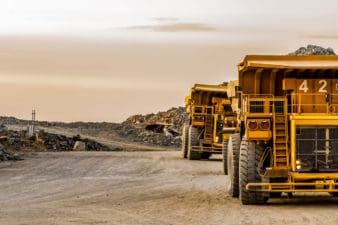Westshore Terminals Investment Corp. (TSX:WTE) made the Globe and Mail’s weekly column about the most overbought and oversold stocks on the TSX. Despite losing approximately 7% of its value between March 5 and 9, investors can rest assured that this was President Trump’s doing.
The company went seven months without its stock trading below $22; however, one tweet from from President Trump about tariffs on steel and aluminum and commodity-related stocks took a tumble.
Yes, I know: the tariffs are against steel and aluminum, not coal, but it appears that coal could be dragged into any trade war that was to develop as a result of the 25% tariff on steel and 10% levy on aluminum.
Brazil, for instance, imports a great deal of metallurgical coal for steel production. It is the largest importer of U.S. metallurgical coal in the world and the second-largest exporter of steel to the U.S., behind only Canada.
That country is far from happy about the 25% tariff and is seriously considering getting its coal from somewhere other than the U.S., which exports about 12% of the coal produced annually in America. Some possibilities include bigger coal-exporting countries such as Australia, Indonesia, and Russia.
The effect on Westshore
Westshore’s customers are coal producers in Canada and the U.S. located in reasonable proximity to the company’s coal terminal in Delta, B.C. The coal is shipped by train to the terminal, where it is loaded onto ships headed for customers in Asia, South America, and Europe.
Westshore is paid for the coal it loads. Fortunately, many of the contracts are of the “take and pay” variety, which means that the company’s customers must pay for the capacity they intend to use regardless of whether they use it.
That’s an important distinction, as Westshore has relatively fixed costs that can’t be lowered when volumes aren’t there.
The thing that I don’t understand is that Westshore processes coal headed for destinations other than the U.S. Thus, even if Canada wasn’t exempted from any coal tariff slapped on U.S. imports, it wouldn’t be affected.
The only thing I can think of is that customers who do ship coal to the U.S., in addition to overseas, would be hurt by them leaving their businesses in a more vulnerable position leading to lower shipments to Asia, etc.
However, it’s also possible that Canadian coal producers would gain new business from countries saying no to U.S. coal exports, which would lead to additional throughput at Westshore’s Delta terminal.
A more plausible explanation for the bad week on the markets is Teck Resources Ltd.’s (TSX:TECK.B)(NYSE:TECK) Q4 2017 earnings results that were announced March 9. Its Q1 2018 guidance specifically mentioned Westshore Terminals in the company’s lower coal volumes.
“Steel-making coal sales volumes for the first quarter of 2018 are now expected to be approximately 6 million tonnes, in comparison to previous guidance of 6.3-6.5 million tonnes,” stated Teck Resources. “Sales continued to be adversely affected by logistics issues during the quarter, particularly ongoing poor performance at Westshore Terminals.”
The bottom line on Westshore buying opportunity
The company has experienced a relatively strong year. In Q3 2017, revenues increased by 16% to $96.3 million, while earnings per share rose 46% to $0.51. For Q1 through Q3, revenues increased by 5.5%, while earnings per share were relatively flat at $1.15.
As Fool.ca contributor Chris Macdonald pointed out in his December article about Westshore, it’s got a healthy 3.0% dividend yield along with a rock-solid balance sheet. As it upgrades the terminal — it’s spending $300 million on new equipment and facilities — it will generate additional cash flow that it can put toward future dividend increases.
In January 2017, I wrote that billionaire Jim Pattison was buying more of the company’s stock, a sign that he saw value at $25 and higher.
However, given Teck’s mention of ongoing poor performance at Westshore Terminals, you might wait until WTE reveals its fourth-quarter earnings later in March.
At less than $21, I’m sure Pattison is buying more.






